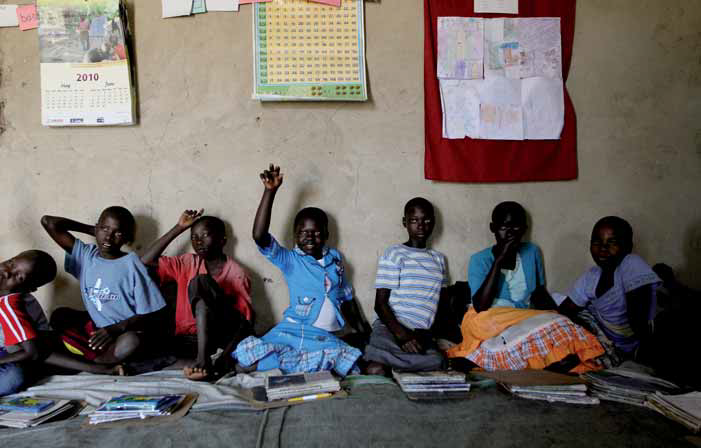World Leaders Agree, Investments in Education must be made for Every Child, Everywhere

Photo by UNESCO/M. Hofer
World leaders met at the United Nations today for the release of the International Commission on Financing Global Education Opportunity’s widely anticipated report, The Learning Generation: Investing in Education for a Changing World. The Education Commission, convened in 2015 by convened by the Prime Minister of Norway, the Presidents of Indonesia, Chile, and Malawi, and the Director-General of UNESCO, was formed following the Oslo Summit on Education for Development to identify keys strategies and resources that will ensure all children and young people have access to quality education needed to thrive in the 21st century.
Comprised of 24 Commissioners, including UN Special Envoy for Global Education Gordon Brown, CEO of Dangote Group Aliko Dangote, and Minister of State for Tolerance of the United Arab Emirates Sheikha Lubna Al Qasimi, the Education Commission brought together leaders from the public, private, and civil sectors to address the staggering 263 million children and young people who are currently out of school worldwide.
This number will only grow if no action is taken. By 2030, explained Gordon Brown, more than 800 million young people around the world will not have received the qualifications necessary to enter the labor market. This, he stressed, is a betrayal of our future that will have negative economic, social, and political ramifications.
Quoting Nobel Peace Prize winner and Founder of Bachpan Bachao Andolan Kailash Satyarthi, Secretary-General Ki-moon expressed, “freedom and learning are the birthright of every human being.” This birthright, as the Education Commission has articulated in its report, is attainable through four main mechanisms, each of which presents critical opportunities for the private sector to engage and generate real, sustainable impact on education:
1. Strengthening the performance of education systems by setting national standards, assessing learning, monitoring progress, and investing in proven best practices
2. Developing innovative and and creative approaches in education systems to achieving results
3. Ensuring that every child, especially the most disadvantaged and marginalized, receive quality education
4. Increasing and improving financing for education from the international community, including governments, financial institutions, investors, and philanthropists
Norwegian Minister of Foreign Affairs Borge Brende emphasized the critical need to act swiftly, stating that “nearly 900 million are not on track to achieve secondary education. If we do not equip our children with the skills they need now, the costs could be irreparable.”
“We have to be bold and we have to be courageous. What our report shows is that unless we change course, and change course now, one billion children will still be denied basic secondary education skills in 2030,” implored Former Prime Minister of Denmark Helle Thorning-Schmidt.
Former Prime Minister of Australia and Chair of the Board of Directors of the Global Partnership for Education Julia Gillard called on the international community to play their part in enlivening this compact for change. The Education Commission, she continued, has “not taken a ‘business as usual’ approach” in considering and developing the report’s recommendations. Putting these recommendations into action is critical, as is each sector’s role in enacting them.
The Role of the Private Sector in Developing a Learning Generation
As Secretary-General of Maghreb Economic Forum and Former Minister of Tourism, Tunisia Amel Karboul shared, “we must make education the first priority,” in order to move from a lost generation to a learning generation. The private sector, specifically, has a critical stake in ensuring that every children has access to quality education, as without this education a healthy, skillful workforce cannot develop. “Education is the key driver of economic growth,” echoed Prime Minister of Norway Erna Solberg.
The Education Commission report outlines the multitude of ways in which business can contribute to the learning generation, such as:
- Using its voice and thought leadership to advocate for education worldwide
- Leveraging its business investments in education
- Supporting employer-led innovation in the design and delivery of education and training
- Expanding innovation in the recognition and accreditation of skills, like the use of digital badges
- Encouraging corporate philanthropy and corporate social responsibility to make substantial and public commitments to education.
Through each of the aforementioned activities and more, the private sector can add tremendous value to developing a learning generation, utilizing its core assets, resources, and expertise to catalyze change for a generation of young people.
“Education saves lives. Education carries hope. Education builds dignity,” intoned Director-General of UNESCO Irina Bokova. With the help of the private sector, the benefits of education enumerated by Director-General Bokova can fully be realized for children around the world.
Find the report in its entirety here to read its findings and recommendations in greater detail.
